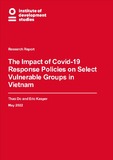| dc.contributor.author | Do, Thao | |
| dc.contributor.author | Kasper, Eric | |
| dc.coverage.spatial | Vietnam | en |
| dc.date.accessioned | 2022-05-30T08:46:11Z | |
| dc.date.available | 2022-05-30T08:46:11Z | |
| dc.date.issued | 2022-05 | |
| dc.identifier.citation | Do, T. and Kasper, E. (2022) The Impact of Covid-19 Response Policies on Select Vulnerable Groups in Vietnam, Brighton: Institute of Development Studies, DOI: 10.19088/IDS.2022.038 | en |
| dc.identifier.uri | https://opendocs.ids.ac.uk/opendocs/handle/20.500.12413/17437 | |
| dc.description.abstract | Despite the significant impact of the pandemic’s fourth wave, Vietnam’s overall strategy was seen as well planned with one of the lowest infection rates globally in 2020–2021. In June 2019, an estimated 540,000 Vietnamese migrant workers were recorded working legally in 40 countries and territories, making Vietnam a major labour exporter and one of the top ten countries to receive international remittances. Our research shows how Vietnam’s Covid-19 policy response has influenced Vietnamese migrant workers and counter-trafficking work, particularly in border areas.
The research discussed four main findings. Firstly, border closures left many overseas migrant workers vulnerable and led them to rely on people smugglers. Secondly, the suspension of commercial international flights and a lack of transparency and favouritism in allocating seats on repatriation flights left many stranded. Thirdly, the national pandemic response plan suffered from limitations. Lastly, Covid-19 policies have led to new trafficking trends and challenges.
Based on this evidence, the research suggests that digitalising and modernising social services could strengthen the inclusion of vulnerable groups, simplify the administrative and management process, save costs, and reduce corruption. Participation of vulnerable groups, especially ethnic minorities and overseas migrant workers, including fishers, should be ensured in national policy design and local implementation. Additionally, improving transparency and accountability of support systems could help gain citizens’ trust in the government, which would be beneficial for future crisis responses. | en |
| dc.description.sponsorship | Foreign, Commonwealth and Development Office (FCDO) | en |
| dc.language.iso | en | en |
| dc.publisher | Institute of Development Studies | en |
| dc.rights | It is licensed for non-commercial purposes only. Except where otherwise stated, it is licensed for non-commercial purposes under the terms of the Open Government Licence v3.0. Covid Collective cannot be held responsible for errors, omissions or any consequences arising from the use of information contained. Any views and opinions expressed do not necessarily reflect those of FCDO, Covid Collective or any other contributing organisation. | en |
| dc.rights.uri | https://www.nationalarchives.gov.uk/doc/open-government-licence/version/3/ | en |
| dc.subject | Health | en |
| dc.subject | Migration | en |
| dc.subject | Social Protection | en |
| dc.title | The Impact of Covid-19 Response Policies on Select Vulnerable Groups in Vietnam | en |
| dc.type | IDS Research Report | en |
| dc.rights.holder | © Institute of Development Studies 2022 | en |
| dc.identifier.team | Knowledge Services | en |
| dc.identifier.doi | 10.19088/IDS.2022.038 | |
| rioxxterms.funder | Default funder | en |
| rioxxterms.identifier.project | Covid Collective | en |
| rioxxterms.version | VoR | en |
| rioxxterms.versionofrecord | 10.19088/IDS.2022.038 | en |
| rioxxterms.funder.project | 15a658e8-70b7-4d70-a299-f35d442f3170 | en |

